social bookmarking tools:
 |
|
| Available RSS Feeds |
|---|
 - Top Picks - Top Picks |
 - Today's Music - Today's Music |
 - Editor's Blog - Editor's Blog
|
 - Articles - Articles
|
Add Louisville Music News' RSS Feed to Your Yahoo!
|

I've Got A Mind To Ramble
Fergie's Story
Personal interviews are an enjoyable way to prepare my articles, especially with someone who has had a colorful past. Steve Ferguson's story is long overdue and I looked forward to our meeting on October 15.
Steve graciously met me at the bottom of the long run of steps that extend up to his house on Payne St. As we ascended and walked around to the back door, we were greeted by Steve's dapper Scottish terrier Bishop's bark, who had recently been clipped and was wearing a Halloween bib around his neck. We settled down in the front room with Steve and Bishop sharing the same couch.
Steve was born in the Clarksdale housing project, which was a predominately white neighborhood then and is now just a memory. After a couple of years, his family moved to the Hazelwood project in the South End and then to a house in Portland. For several years, it was back and forth between Okolona and the West End looking for a better deal. At that time 'projects' weren't considered low-income housing, just cheaper apartments.
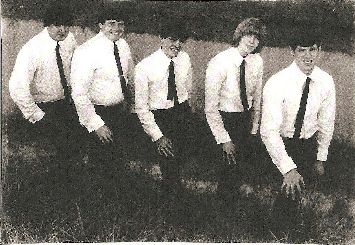
The only (other) musician in the Ferguson family was bluegrass master Bill Monroe, who was a fourth cousin, an interesting fact that Steve found out later in life. While he was livingon 34thStreet in the West End, Steve hung out with the Lloyd Brothers, who were devout jazz fans and musicians. They influenced Steve with their records and took him to hear Miles Davis. Steve started listening to WLOU, which was Louisville's main black station for R & B. Steve remembered deejay Shoby Dove spinning records by B.B. King, Jimmy Reed and Ike & Tina Turner. He had to listen in the back room to keep his uptight parents from knowing he was listening to a black station.
Steve took a few lessons on the cello but didn't like it, especially when he was playing the Peter Gunn theme and the teacher made him stop. Steve would go hear Cosmo (Tommy Cosdon) when Wayne Young was playing guitar with the Counts. Steve said "Wayne played just like B.B. King at that time." In 1962, Steve formed his first group, The Squires, at thirteen. Within a month after he started playing his guitar, he was playing professionally.
Steve first met Terry Adams in 1965 when Steve was starting the Mersey-Beats USA and needed a keyboard player. Terry auditioned; their musical relationship has continues to this day. Shortly after that meeting, they both attended a big R&B show at the Armory that included Sam and Dave, Wilson Pickett, Jr., Walker and The Allstars and Billy Stewart. The Mersey-Beats USA did British covers, which was popular at the time. They had to add the USA because there was already a British band named Mersey Beats. Steve and Terry started writing their own original material and in late 1966, they left the band to begin what would eventually become NRBQ (New Rhythm and Blues Quartet). Terry's brother, Donn Adams, booked gigs for them.
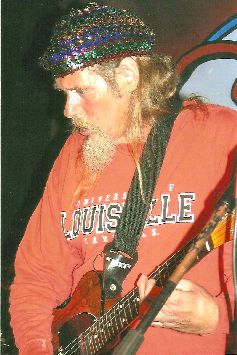
Terry went to Florida to play organ with a group called The Seven of Us. Steve joined in New Jersey. When that band broke up, part of the personnel became the foundation of NRBQ. Steve credits Donn Adams with the name. The original version of NRBQ included Steve, Terry, Joey Spampinato on bass, Frankie Gadler doing vocals and drummer Tom Staley. Later, for live shows and recording sessions, the Whole Wheat Horns, with Louisvillians Donn Adams on trombone and Keith Spring on saxophone, were added. NRBQ's star rose quickly, with a Columbia recording contract in 1969 which resulted in several singles, including "Stomp," and two albums. NRBQ collaborated with another Columbia recording artist, Carl Perkins, on "Boppin' The Blues."
NRBQ switched to the Kama Sutra label in 1972 and recorded their zany hit "Howard Johnson's Got His Hojo Workin'." Steve left the band in 1971 only to return again briefly in 1974 for a six-month tour. There were several personnel changes later that year with Steve, Frankie and Tom leaving for good. Steve was a father and returned to Louisville to do occasional gigs around town.
Steve's first local album under his own name was Fun for Foolswith The Humanitarians. The jacket cover shows a group of people trying to figure out where to put the last X on the tick tack toe. Steve played at Uncle Pleasants, Air Devil's Inn, Cherokee Blues Club, The Bluebird and the American Music Festival during the Eighties, being selective about his gigs so as not to get burnt out. The Bluesday Tuesday Jams at the Rudyard Kipling during the late Eighties were an opportunity for local musicians like Sue O'Neil, Curtis Marlatt and ‘Screamin' John Hawkins to get some exposure. Steve frequently was there with his black chimney sweep hat and red Fender Telecaster.
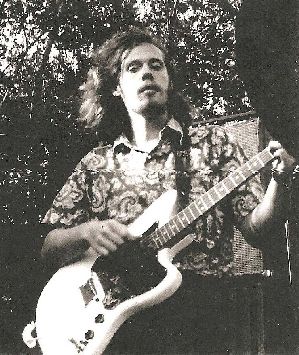
Many of the Humanitarians became the Midwest Creole Ensemble when it was formed in 1989. Steve said, "that name was a personal identity at that time." The liner notes from his 1992 CD, Jack Salmon & Derby Sauce,state that its origins came from the cultural mix of Scotch-Irish settlers and African-Americans. This inter-racial blend combined with Steve's love of local foods inspired Midwest Creole.
Steve and his band traveled the country in a big van performing at the Frog Island Festival with Los Lobos, the Alligator Lounge in L.A., the Arch Club in Ann Arbor, "Mountain Stage" in West Virginia, plus sojourns to Louisiana. The audience was usually prepared for Steve's higly individual sound, thanks to promo radio spots his booking agent Harriet Kyriokos provided.
Steve was reunited with some of the NRBQ alumni on December 1990 at the Ultrasonic Studios in New Orleans to record with piano legend Johnnie Johnson. Steve and Terry Adams composed "Johnnie B. Bad," the title cut for the CD. Steve's lead guitar can be heard on seven cuts, including when he traded licks with Eric Clapton on "Blues 572." [Clapton's guitar was dubbed in at another time and place, as he was grieving the tragic loss of his young son.] St. Francis High School recognized Steve in 1993 with a Master Musician Concert at the Kentucky Center for The Arts. The Midwest Creole Ensemble was pumped up with several horns and The Blue Angels Choir. It was a night I will never forget as they rocked the Bomhard Theater. Steve remembered it as a fun show where he received a mint julep cup.
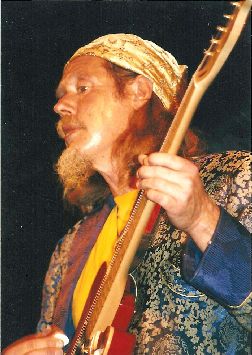
Operation Blues Assault was initiated by Steve in 1996 because he felt the blues was dying so fast. He wanted to build an army of blues artists and fans. For three consecutive Tuesdays, he packed Air Devils Inn with five to six bands a night. That was Steve's version of 'shock and awe.'
To best appreciate Steve's music you need to experience him in person. His two live CDs, Mo Ho Criollo,recorded at Air Devil's in 1997, and Two Dollar No Holler,captured at Barretones in 2001 come as close as you can get to the funky, syncopated rhythms that only Steve can do. There are no Steve Ferguson imitators but there are many local guitarists who have been influenced by Steve's double stops and country bends.
In 1999 Steve worked with WFPK on what was to be an annual benefit for the radio station. It was a combined music, art and food festival that included Celtic/African art displays with several bands and food vendors at Headliners. Unfortunately the audience got drunk and didn't appreciate the theme about the Midwest Creole. This was a disappointment for Steve.
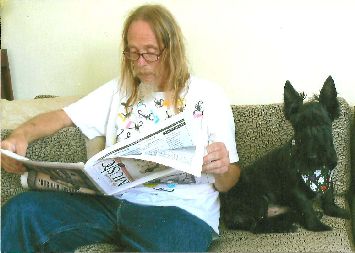
The album Mama U Sepawas a later collaboration between Steve and Terry as well as Louisville Sluggers,which was released in 2006. When they recorded the Sluggersrecord, Steve said, "We were free to do whatever we felt like doing, covering anything and everything."
The current line up of the Ensemble that played with Steve at the September 7 MERF benefit at Stevie Ray's is Bob Ramsey on keyboards, David Marasco on drums, Pat Lentz on guitar and bassist Bob ‘Monk' Mackey. All of these talented musicians have been a part of Steve's band since the mid Eighties.
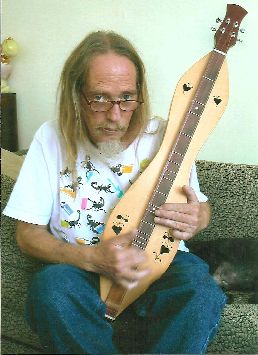
I asked Steve what is the inspiration for his original songs. He replied, "It is the situation around me." "Shake and Bake" came from his previous wife, who was a pastry chef at Jack Fry's. "Stepped In What?" was inspired when he actually stepped in dog scat. "Cops and Robbers" was politically motivated by the Reagan-Mondale presidential campaign. You never see Steve without some kind of bizarre headwear when he is on stage. He replied, "I wear a hat when I play, for I feel naked when I don't."
Sheri has been Steve's wife for six years and takes good care of him. Steve has recently lost his passion for his fiery brand of rockin' blues. His life has taken on a more spiritual direction, due to the condition of his health. He has been working on a Judeo-Christian prayer book. Steve wants to accompany these prayers with Sacred Harp songs. This full-voiced Gospel singing (not to be confused with Sacred Steel) has dominated his time. This is a primitive form of reading the notes as shapes and is sung a cappellawith the vocal chords acting as the harp. The movie "Cold Mountain" had excerpts of this music during a church scene. Steve hopes to have a group come to Louisville from Ann Arbor to perform and teach this music so there will be a local group of Sacred Harp singers.
At the end of our interview Steve picked up his beautiful baritone mountain dulcimer made by Folkcraft and started fingering some inspiring, delicate chords.
